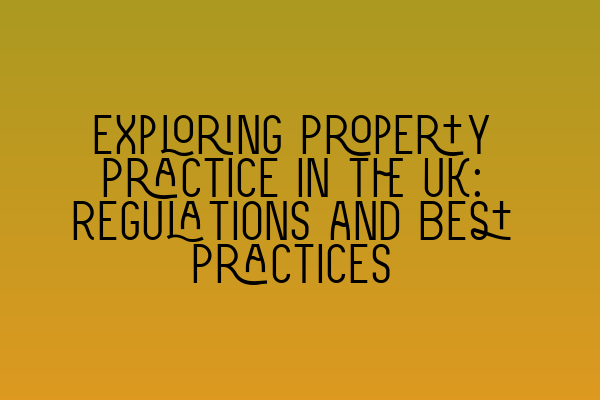Property practice in the UK is governed by a set of regulations and best practices that ensure the smooth buying, selling, and management of properties. As a solicitor specializing in property law at SQE Property Law & Land Law, I have seen firsthand the importance of adhering to these regulations and implementing best practices to protect the interests of clients.
One of the key aspects of property practice in the UK is understanding the legal framework surrounding property transactions. This includes knowledge of statutes such as the Land Registration Act 2002, which governs the registration of land and property ownership, and the Town and Country Planning Act 1990, which regulates land use and development.
When it comes to property transactions, there are also specific regulations that must be followed, such as the Money Laundering Regulations 2017, which require solicitors to carry out due diligence checks on clients to prevent money laundering and terrorist financing. Additionally, the Consumer Protection Regulations 2008 protect buyers and sellers against unfair practices and ensure transparency in property transactions.
As a solicitor, it is crucial to stay up to date with changes in property regulations. This can be achieved through continuous professional development, attending relevant courses and seminars, and keeping an eye on updates from regulatory bodies such as the Solicitors Regulation Authority (SRA).
In addition to regulations, there are also best practices that solicitors follow to provide the best possible service to clients. These best practices include conducting thorough property searches to identify any potential issues or restrictions, such as planning permissions or rights of way. By conducting these searches, solicitors can advise clients on any risks or concerns associated with a particular property.
Another essential best practice is ensuring clear communication with clients throughout the property transaction. This includes providing regular updates, answering any queries promptly, and explaining complex legal terms in a clear and understandable manner. Effective communication is key to building trust and maintaining a positive client-solicitor relationship.
Furthermore, solicitors must adhere to ethical standards when practicing property law. This means acting in the best interests of clients and maintaining confidentiality. It also involves avoiding conflicts of interest and disclosing any potential conflicts to the client.
As an SEO expert, I understand the significance of integrating relevant keywords to increase visibility and drive organic traffic to our website. Keywords such as “SQE 1 Practice Exam Questions,” “SQE 1 Practice Mocks FLK1 FLK2,” “SQE 2 Preparation Courses,” “SQE 1 Preparation Courses,” and “SRA SQE Exam Dates” are essential for individuals preparing for the Solicitors Qualifying Examination (SQE) and seeking information on our courses and exam dates.
If you are a prospective solicitor preparing for the SQE, I highly recommend checking out our SQE 1 Practice Exam Questions to test your knowledge and assess your readiness for the exam. Our SQE 1 Practice Mocks FLK1 FLK2 are designed to simulate the actual exam experience, allowing you to familiarize yourself with the format and content of the exam.
For comprehensive preparation, we also offer SQE 2 Preparation Courses and SQE 1 Preparation Courses that cover all the essential topics and equip you with the knowledge and skills necessary to succeed in the SQE. We also provide detailed information on the SRA SQE Exam Dates so you can plan your studies effectively.
In conclusion, property practice in the UK is regulated by a set of laws and regulations that solicitors must adhere to. By understanding and implementing these regulations and best practices, solicitors can provide excellent service to clients and ensure smooth property transactions. If you are preparing for the SQE, make sure to check out our practice exam questions, mocks, and preparation courses to enhance your chances of success.
